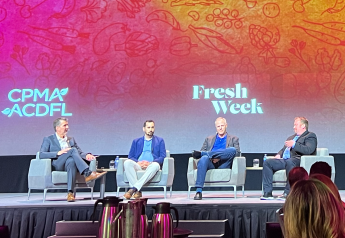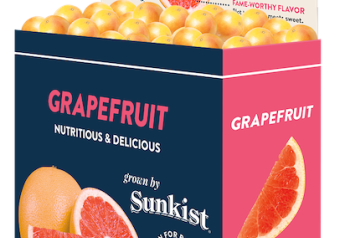Packer interview with Michelle Grainger Part 2
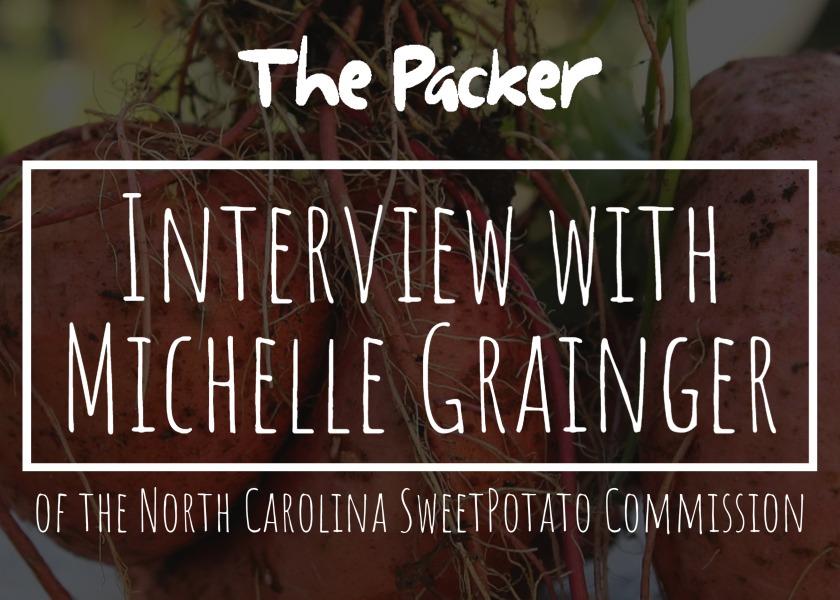
The Packer: As you think about the industry and the challenges they face, what are some of the things that come to mind?
Grainger: It almost always starts and stops with labor.
And now as we have even more labor shortages across the state and country, as we’re seeing right now, it’s even more top of mind, although most of the labor that our growers rely upon are through the H-2A program. The issues that we’re experiencing with border and immigration and the political elements that are all taking place is adding more pressure to our growers, not to mention the politics around the wage rates and the documentation that’s required for (H-2A). So that’s always a first bullet (point). Closely thereafter is weather; we can’t control the weather, but yet we are ever so reliant upon the weather and the weather working in our favor. Last week I was hearing how dry it was and the wind was blowing and what a nightmare it was, and then by the end of the week, we had hail in the eastern part of our state and that was damaging to many crops. Sweet potatoes fared OK, but most of our growers are very diversified in what they produce, and so other elements and divisions of their operation were impacted by that. Here in North Carolina are we have a large portion of our industry who export; international politics also play a huge role of concern. We’re very appreciative that right now the EU retaliatory tariffs (on sweet potatoes) are on hold. We are very prayerful and hopeful that all the negotiations that are taking place will be successful in the end and so that hold on tariffs becomes permanent versus temporary. That will have a very negative impact if it’s not successful. So those are the three areas that I am spoken to quite frequently about.
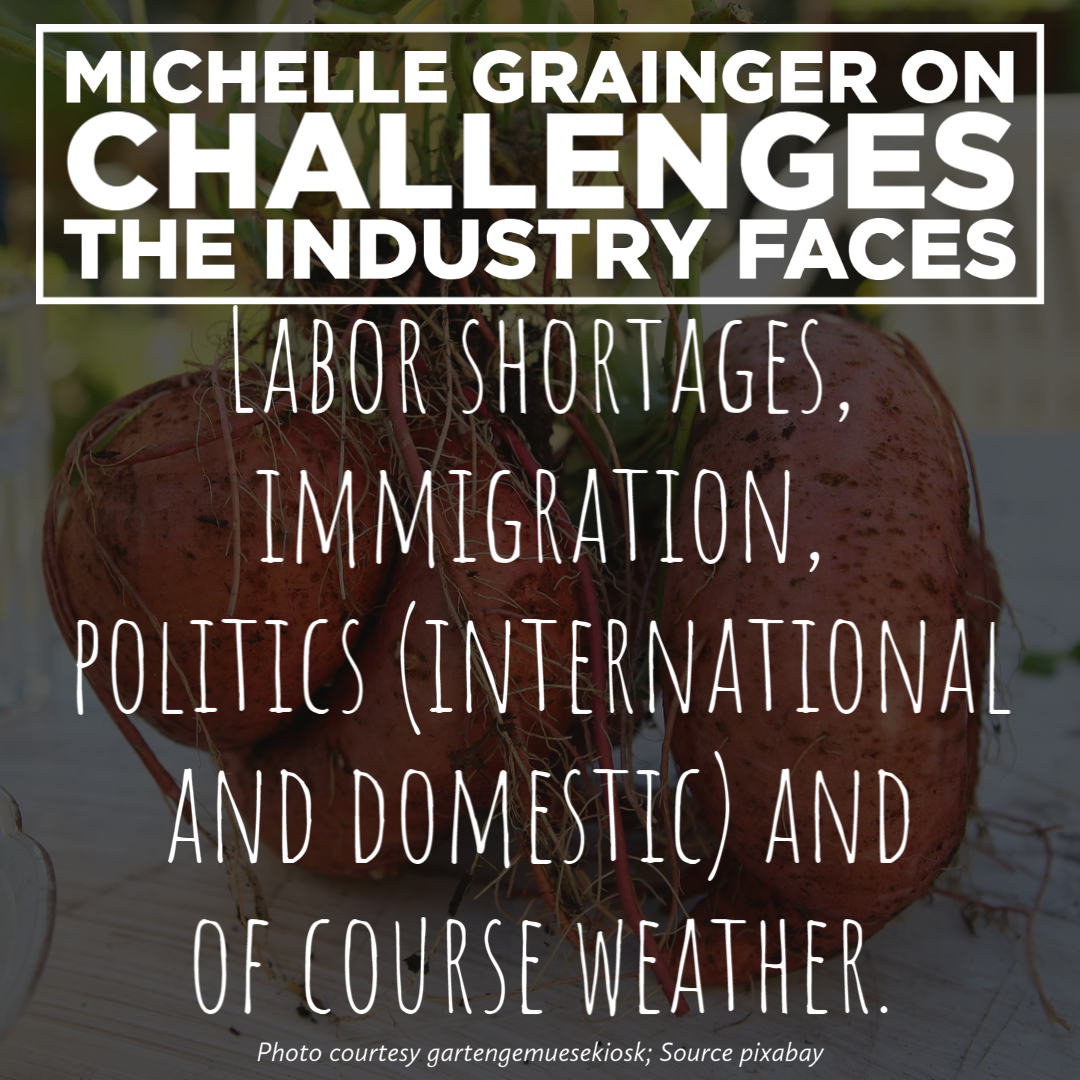
The Packer: Any thoughts about where the labor issue goes from here? I know you’re advocating for your growers. I suppose the reliance on H-2A will only increase, from what we have been hearing.
Grainger: Yes, I agree, the reliance on H-2A will absolutely increase. And yet, as our leaders in Washington make decisions on the wage rate and how that is determined, in addition to the fees associated with the H-2A program, that adds significant pressure, and honestly, threats to any of us who are in specialty crops and particularly produce because many of our neighboring competitors outside of the U.S. do not have the labor inputs that we all have here, and particularly in North Carolina, being so focused on specialty crops as we are. That’s a real pressure point that we’re continually advocating for and trying to educate our leaders who sit in positions of influence to further educate their peers, where those decisions are being made.
The Packer: You have a commodity (in sweet potatoes) that has kind of been on a hot streak and has been increasing in popularity and also doing well in export markets. What’s the potential to expand demand even further?
Grainger: I think every challenge has a silver lining and the silver lining for the pandemic, at least one of them, has been the new resurgence and focus on health food and eating healthy, and certainly how to cook at home more often than what we have been doing as a society. From an opportunity standpoint, I see green fields for days, literally, of what we can be doing and the directions that we can take. I think the value-add market space is only going to increase, particularly as food science and innovation continues to help push us in that direction. As consumer awareness grows in the knowledge of the nutritional benefits of our great superfood that we have, and the fact that it doesn’t have to have marshmallows on it, it doesn’t have to
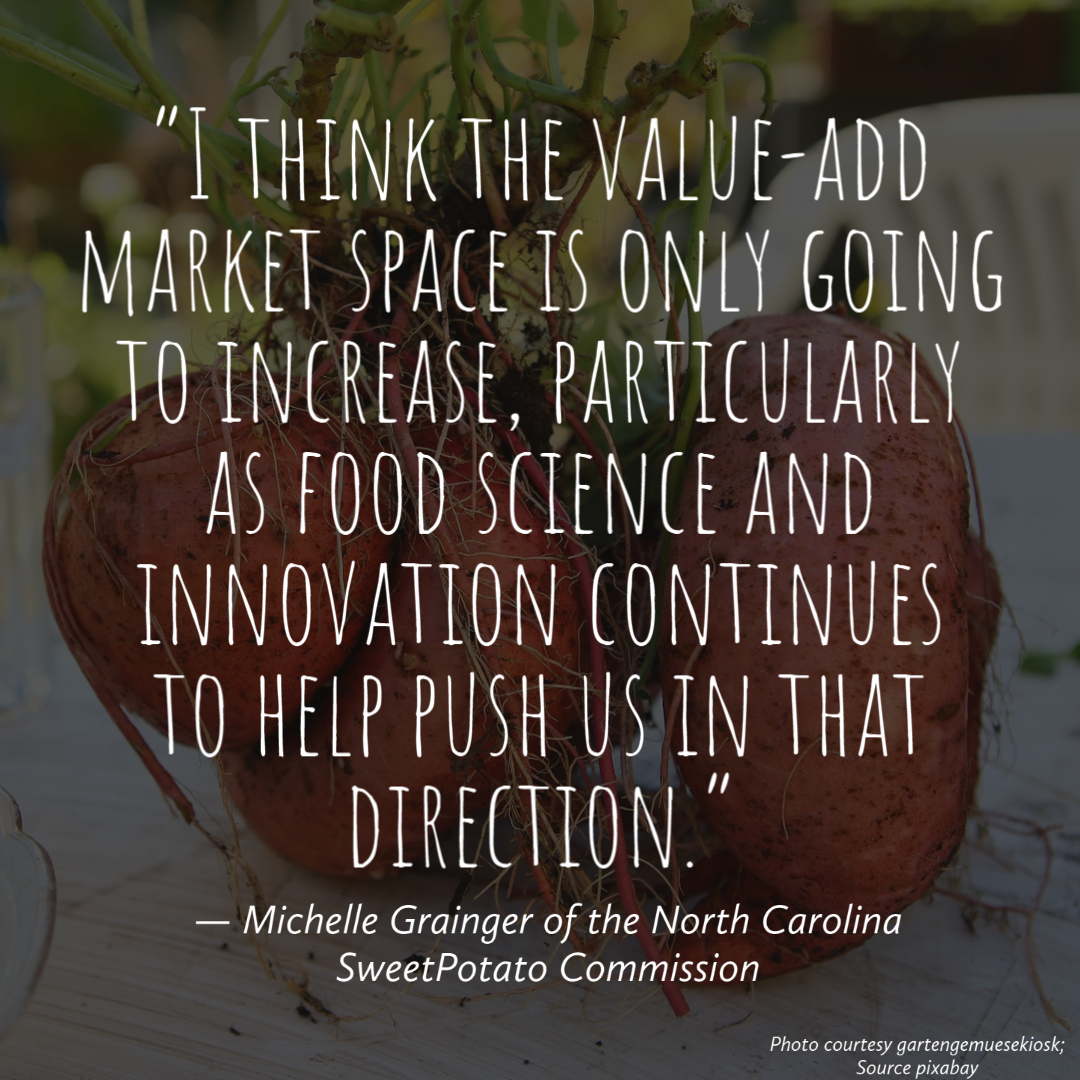 even have brown sugar or cinnamon. (Sweet potatoes) can be quite savory, and they lend themselves to all kinds of international cuisines where they work very beautifully with those different flavor profiles. As we continue to educate the consumer on the ability to expand their palate of how they might consume sweet potatoes, that is an incredible opportunity as well. Certainly, in the international marketing space, we’re already diving into new markets. We are very fortunate to have a significant partnership with the North Carolina Department of Agriculture, and through that partnership, we are working together this year to do some new market research with the (United Arab Emirates), and perhaps some other countries in the Middle East. We are continuing to work on our efforts in the European Union and the United Kingdom to expand how we reach those consumers. And we are actually investing quite a bit in this coming year with our footprint in Denmark. There are so many different areas or lanes that one can take. And it’s really exciting from where I sit, to have all of these conversations and to see them come together.
even have brown sugar or cinnamon. (Sweet potatoes) can be quite savory, and they lend themselves to all kinds of international cuisines where they work very beautifully with those different flavor profiles. As we continue to educate the consumer on the ability to expand their palate of how they might consume sweet potatoes, that is an incredible opportunity as well. Certainly, in the international marketing space, we’re already diving into new markets. We are very fortunate to have a significant partnership with the North Carolina Department of Agriculture, and through that partnership, we are working together this year to do some new market research with the (United Arab Emirates), and perhaps some other countries in the Middle East. We are continuing to work on our efforts in the European Union and the United Kingdom to expand how we reach those consumers. And we are actually investing quite a bit in this coming year with our footprint in Denmark. There are so many different areas or lanes that one can take. And it’s really exciting from where I sit, to have all of these conversations and to see them come together.
The Packer: That is exciting, and I’m sure you probably would like to book a few trips to those countries. That will be coming at some point, right?
Grainger: It will be coming; I keep being promised by all of our partners internationally that they are just waiting for the day for me to get on a plane. I have a current passport that is very anxious to receive stamps. And when we have to get past the point where it’s going to be safe to travel and make it feasible to do so. As soon as that day comes, my bag will be packed, and I will be gone.
The Packer: And of course, with the produce shows in the U.S. …
Grainger: Exactly. There are so many (U.S.) shows that I’ve missed out on in this first 10 months of tenure because of COVID, and I can’t wait to dive in soon to in-person events.
The Packer: Finally, Michelle, as you as you think about your stamp on the commission, and the marketing messages and the communication that you’re trying to accomplish, what are some highlights for this year and as you look forward?
Grainger: Well, I can’t necessarily say that it’s my personal mark. But this year is a big year for the commission and that it’s our 60th anniversary — June 30 of this year is the technical birthday. But we are taking advantage of stretching it out all year long. And I’m really excited to be coming into the commission with such a milestone. Not many commodity groups are able to experience such longevity, and particularly with such health and structure as the commission has had. To be able to celebrate that and to celebrate all those who helped make it possible is very exciting. It’s also the year, according to the United Nations, of international fruits and vegetables. I think those two things align very nicely together. And I feel very fortunate to get to tag on to both. We have tremendous efforts going forth in curriculum, and STEM-oriented, specifically, curriculum to introduce future generations to the sweet potato well before they start becoming shoppers themselves. And I’m very proud of that. That’s one space. We’re working with retail registered dietitians; that’s another area that we are really expanding on. And again, tying back to consumer awareness of health and healthy eating, we’re trying to build a community of registered dietitians that we can train and collaborate with going forward. I think a new hashtag that we have started, which we’re using quite frequently, is #EatsweetNC, and having the opportunity to represent the leading producing state in the country, as well as the lead exporter of the country of the sweet potato, and coming up with new and creative ways to raise awareness of such leadership and the value of it is really an honor. I’m continually thinking, what is that messaging and how do we go about doing it? A lot will be coming forth in the next six to seven months, all around the 60th anniversary, building upon opportunities to further make that message louder of the premium North Carolina sweet potato and the incredible growers that we have, ensuring that this superfood that comes to your plate in many forms and fashions is done so with the highest integrity, utilizing the most advanced technology and innovation and knowledge from research and having the most flavorful sweet potatoes available.






